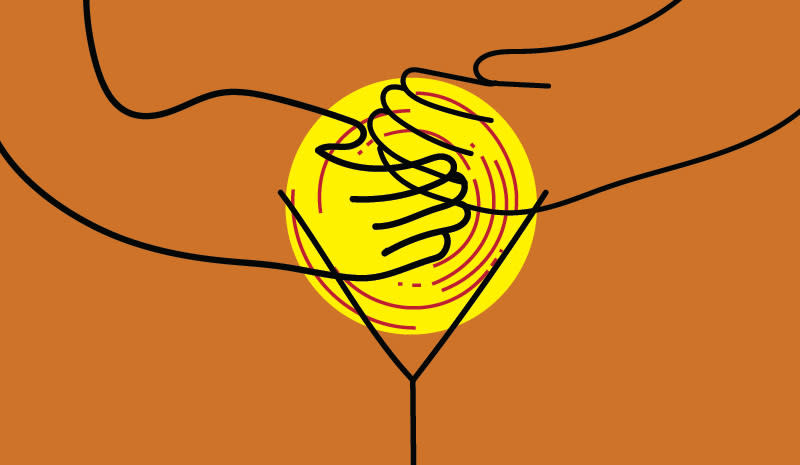5 things that don’t cure UTIs
If you’re anything like me, you’ve tried everything and anything to prevent the tell-tale burning sensation signalling a UTI has arrived. 50% of women will have a UTI at some point in their lives and 25% of women will experience a recurring infection. I’ve lost many hours to Google, doubled over in pain and unable to think straight, desperately searching “cure UTI quick”.

UTIs, or lower urinary tract infections, are caused by bacteria from poo entering the urinary tract. Women have a shorter urethra than men, which means bacteria are more likely to reach the bladder and cause an infection.
Sadly, there is no preventative cure for UTIs, with a potential vaccine still in its earliest investigative stages. Antibiotics have been proven to effectively treat UTIs, but for women who regularly take antibiotics to address recurrent infections, there's a fear of antibiotic resistance. There are many natural remedies claiming to be miracle cures with no need for antibiotics. So what does and what doesn’t cure UTIs?
Cranberry juice
We’ve all heard that cranberry juice carries magical UTI-busting powers. The theory goes that cranberries stop bacteria from being able to cling onto the walls of the urethra and flushes out the infection. Some people believe taking daily cranberry tablets with a higher concentration of cranberries can prevent recurrent infections.
Unfortunately, there is very little evidence in scientific research to support this theory and any benefits are likely to just be a placebo.
Peeing after sex
Longing for a post-coital cuddle but rushing off to the toilet immediately after sex? Sex is a trigger for UTIs in many women, as bacteria can easily transfer to the urethra through the hands, genitals and anus rubbing together. Many people believe that urinating immediately after sex flushes away “bad bacteria” and can prevent a urinary tract infection.
There is some evidence to suggest that peeing up to 30 minutes after sex can help reduce the risk of contracting a UTI. But is it foolproof? Before you set the 30-minute stopwatch, the short answer is that we’re not sure, but it’s worth a try. There are many other factors that play a role in triggering a UTI, like how much water you drink and how much you pee normally, so it’s difficult for researchers to isolate the right variable. If heading to the toilet after sex makes you feel more comfortable, go forth and pee!
Probiotics
Many people swear by probiotics to keep their insides happy. This is part of a general trend towards “wellness” rather than reliance on medical intervention, like taking antibiotics. The idea is that encouraging the growth of “good bacteria” can help balance bacterial growth in your bladder and prevent “bad bacteria” from multiplying.
Some small studies have been taken to test the effectiveness of specific strains of lactobacilli in preventing UTIs with encouraging findings. However, further research is needed to confirm these results. Wellness culture can lead to paranoid scepticism about science and it’s important to balance medical expertise with your own experience of your body!
D-mannose
D-mannose is a type of sugar related to glucose. You can buy D-mannose tablets online, sometimes offered as part of “UTI treatment packs” from the USA, packaging up D-mannose and cranberry extracts in fancy bundles.
Early studies suggest that D-mannose can be effective in preventing UTIs. However, there isn’t much research on the effects of D-mannose when taken as a treatment for an existing UTI, but a few early studies show that it might help. If you want to give it a try, you can splash out online!
Showering after sex
You don't have to hop out of bed and into the shower right away! But gently cleaning yourself after sex can help protect you from UTIs and other genital problems.
However, it’s not a foolproof method for totally preventing UTIs, as bacteria may be living inside the urethra, so can’t be washed away by externally cleaning your genitals. Cleanliness after sex is an important part of general sexual hygiene, so if it makes you feel good, get the water running (no pun intended!)
It’s easy to lose heart when looking into UTI treatment, especially when you feel that your pain is dismissed or not understood. Unfortunately, for many women, recurrent UTIs are a longstanding issue. If you’ve had more than one UTI in the last few months, it’s important to go and speak to your GP, who can carry out further investigations to make sure there are no underlying health conditions triggering the infection.
Antibiotics are still the most effective treatment for dealing with a UTI. Antibiotics can also prevent a UTI from developing into a more serious infection or spreading to your kidneys. Do try the other “natural remedies” in our list to ease your symptoms and let us know what works for you!


